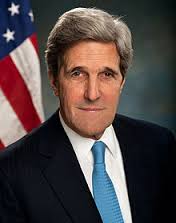
SHARM EL-SHEIKH, Egypt (Press Release) — Meeting with reporters after his economic discussions with Egypt’s President Abdel Fattah al-Sisi, U.S. Secretary of State John Kerry on Saturday, March 14, spoke about the “tough” and “intense” P5+1 nuclear negotiations with Iran that will resume on Sunday in Lausanne, Switzerland. Here are excerpts from Kerry’s meeting with the media.
From the beginning, these talks have been tough and they’ve been intense, and they remain so. And we’ve made some progress, but there are still gaps, important gaps, and important choices that need to be made by Iran in order to be able to move forward.
Now I want to be very clear. Nothing in our deliberations is decided until everything is decided. And the purpose of these negotiations is not just to get any deal; it is to get the right deal. President Obama means it when he says, again and again, that Iran will not be permitted to get a nuclear weapon. As you all know, Iran says it doesn’t want a nuclear weapon, and that is a very welcome statement that the Supreme Leader has, in fact, incorporated into a fatwa. And we have great respect – great respect – for the religious importance of a fatwa. And what we are effectively trying to do is translate that into legal language, into everyday language within the framework of a negotiated agreement that everybody can understand, which requires everybody to have certain obligations and ultimately be able to guarantee that Iran’s program, its nuclear program, will be peaceful now and peaceful forever.
Now sanctions alone can’t achieve that. We need a verifiable set of commitments. And we need an agreed-upon plan that obviously provides the access and the opportunity to be able to know what is happening so that you can have confidence that the program is, indeed, peaceful. That’s what we’re negotiating about. And we need to cover every potential pathway – uranium, plutonium, covert – that there might exist towards a weapon, and only an agreement can do that.
So what’s the alternative? In previous years, when U.S. policy was not to talk to Iran and insist at the same time that they could have no nuclear program whatsoever, the number of centrifuges skyrocketed. Every time negotiations have broken down in the past, Iran’s nuclear program has advanced. Only the joint plan, which Iran agreed to and fully implemented, has actually succeeded in freezing Iran’s program for the first time in nearly 10 years, and even rolled it back in some cases. And they agreed to that, because they have an interest in proving that their plan is peaceful.
The comprehensive plan will lock in, with greater specificity and breadth, if we can arrive at it, the ways in which Iran will live up to its international obligations under the NPT for the long term. So we continue to be focused on reaching the right deal, a deal that would protect the world, including the United States and our closest allies and partners, from the threat that a nuclear-armed Iran could pose.
We still don’t know whether or not we will get there, and that’s why I will travel to Lausanne in Switzerland tomorrow in order to meet with Foreign Minister Zarif and once again engage in talks to see if we can find a way to get that right deal.
As I have said previously, it may be that Iran simply can’t say yes to the type of deal that the international community is looking for. But we owe it to the future of everybody in the world to try to find out. If we cannot get to a diplomatic agreement, make no mistake, we obviously do have other options. But those options will mean no transparency, they will mean no verifiable set of commitments, and they don’t close off Iran’s potential pathways to a nuclear weapon for nearly as long as a negotiated agreement can, if it’s the right agreement. And so we will return to these talks, recognizing that time is of the essence, the clock is ticking, and important decisions need to be made.
*
Transcript provided by the U.S. State Department. Your comment may be posted on this website, per the instructions below:
__________________________________________________________________
Care to comment? San Diego Jewish World is intended as a forum for the entire Jewish community, whatever your political leanings. Letters may be posted below provided they are civil, responsive to the article that prompted them, and signed with your first and last name, as well as with your city of residence. There is a limit of one letter per writer on any given day.
__________________________________________________________________